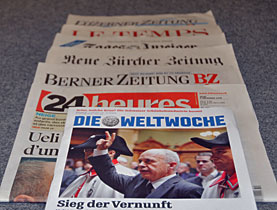“Switzerland could learn from Germany”

Swiss commentator and Europe expert Roger de Weck says Switzerland is a strong democracy but its political institutions are in urgent need of an overhaul.
In an interview with swissinfo following this week’s cabinet election, de Weck talks about the place of the rightwing Swiss People’s Party and the political future of its figurehead Christoph Blocher.
Blocher was one of two official candidates put forward by the party, along with Ueli Maurer, to take over the cabinet seat of Defence Minister Samuel Schmid, but parliament voted instead for Maurer.
De Weck, who divides his time between Zurich and Berlin, believes Switzerland could learn from neighbouring Germany the importance of the rule of law and the need to safeguard basic rights.
swissinfo: What was your impression of this week’s cabinet election?
Roger de Weck: Parliament, with one abstention, voted unanimously for candidates from the rightwing People’s Party. A parliament that, with the exception of one individual, chooses people from just one party is unique in the world.
swissinfo: It was argued that the People’s Party was underrepresented in government.
R. de W.: The word “underrepresented” implies that we have a government with proportional representation, where every party has equal claim to this or that many seats in the seven-member cabinet – depending on the number of seats it has in parliament, or its share of the popular vote.
That is not the case. Previously politics in Switzerland was marked by consensus. This Latin word means accord. If you have a minimum of accord, you can reach agreement on the distribution of the seven seats in the cabinet.
swissinfo: Switzerland’s image abroad suffered during the era of Christoph Blocher, who was a cabinet minister from 2004 to 2007. What will change under Ueli Maurer?
R. de W.: We will have a minister who, in his previous political life, was responsible for posters which clearly appealed to the racist sentiments of Swiss people and therefore caused huge consternation abroad. But the German press stressed instead the fact that Christoph Blocher was not re-elected and, from the point of view of German journalists, will possibly play no further role in Swiss politics.
swissinfo: Will Blocher now disappear off the political stage?
R. de W. : I doubt it. You can’t rule out that Blocher will aspire to and even obtain Maurer’s vacant seat as head of the powerful Zurich branch of the People’s Party. It is possible, maybe even probable, that [being a billionaire] he will continue to finance People’s Party campaigns.
In the coming years there needs to be more transparency over the funding of parties and of vote and election campaigns. This modernisation of our political institutions is overdue. It is unhealthy that people with a lot of money can secretly influence our politics so much – particularly now in the light of the financial crisis.
swissinfo: In many European countries rightwing populists are becoming more successful. Blocher is often compared abroad to Le Pen in France or Berlusconi in Italy. How accurate are these comparisons?
R. de W.: Every form of populism is different. In my view you can’t make a direct comparison. But rightwing populism in Europe takes the same basic shape. The similarity consists in the fact that there is usually a strong man, who is very rich and who uses a lot of money to pursue his own politics.
Another feature is an objective coalition between the populists and the tabloid press. Both operate in the same way, they offer simple solutions, focus on conflict instead of compromise and emotionalise politics.
swissinfo: In Germany there is currently no prominent rightwing politician. Has the country learnt from its mistakes?
R. de W.: Germany remains under the spell of its trauma with National Socialism – and that is healthy. It would be unthinkable there for a strong character to come from the right so quickly. That speaks well for Germany and the vibrancy of its democracy today.
The German constitution is one of the best in the world. If there’s one country that has become a democracy – and a very healthy one at that – that might, like all others, have problems and mistakes but at its core provides for a good distribution of power and prevents superiority, then it’s Germany.
swissinfo: Switzerland likes to present itself as a model democracy – what can we learn from Germany?
R. de W.: The rule of law. In Switzerland we have a strong democracy but a weak rule of law. Because individual articles of the federal constitution can be changed – and sometimes abused – by referendums, and because we have such a strong democracy, we forget the rule of law and protection of basic rights.
A whole list of xenophobic initiatives, which were either launched or supported by the People’s Party, violate human rights. The minaret imitative, which wants to ban the building of minarets, limits religious freedom. The deportation initiative, which wants to expel not only criminal foreigners but also their families is closely connected to the Nazi’s principle of Sippenhaft [collective punishment], which goes against all human rights.
The protection of basic rights, as is practised in Germany, is certainly something we could learn from Germany.
swissinfo: Does Swiss direct democracy foster populist movements?
R. de W.: Yes, it does. But strong populist movements also exist without direct democracy. Unlike many other rightwing populist groups in Europe, Swiss populism cannot define itself ethnically because of Switzerland’s composition. There is no such thing as a Swiss ethnic group – we are a nation of many cultures and languages.
Swiss populism defines itself instead more by its absolute interpretation of democracy. It says that anything that limits the public’s freedom – to even the smallest extent – is unbearable. This attitude comes from an imbalance between democracy and rule of law.
Our founding fathers deliberately did not entrust every single thing to the people. If an absolute popular government, a democratic absolutism were to prevail, the minorities would overrun. Our political system wanted to prevent that. The populists, who invoke Swiss values, ignore this valuable Swiss tradition.
swissinfo-interview: Susanne Schanda
Roger de Weck is a journalist based in Zurich and Berlin and is a contributor to newspapers in Germany, France and Switzerland.
He is also the presenter of the television programme “Sternstunde”.
A native of the city of Fribourg, he is the chairman of the board of trustees at the Graduate Institute of International and Development Studies in Geneva and a visiting professor at institutes in Bruges, Belgium and Warsaw, Poland.
Previously he was editor-in-chief of Zurich’s Tages-Anzeiger newspaper and of the Hamburg weekly, Die Zeit.
De Weck is a member of International PEN, a writers’ association, on the board of trustees of the Charlemagne Prize and has received an honorary doctorate from Lucerne University.
He studied economics at St Gallen University.
People’s Party stalwart Ueli Maurer was elected to Switzerland’s cabinet on December 10, effectively bringing the party back into the seven-member executive after a year’s absence.
The election came one year after the controversial People’s Party justice minister, Christoph Blocher, failed to be re-elected. Party moderate Eveline Widmer-Schlumpf replaced him.
Widmer-Schlumpf, from canton Graubünden, was eventually kicked out of the People’s Party along with Defence Minister Samuel Schmid. They both now represent the breakaway Conservative Democratic Party.

In compliance with the JTI standards
More: SWI swissinfo.ch certified by the Journalism Trust Initiative













You can find an overview of ongoing debates with our journalists here . Please join us!
If you want to start a conversation about a topic raised in this article or want to report factual errors, email us at english@swissinfo.ch.